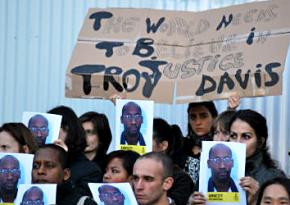Saved from the death chamber
and report from Georgia on another last-minute victory for an innocent man.
FOR THE third time in 16 months, Georgia death row prisoner Troy Davis has been saved from a scheduled execution by a last-minute stay.
On October 24, a three-judge panel of the 11th U.S. Circuit Court of Appeals halted Davis' execution, set for three days later, so his lawyers could make their case that evidence of his innocence should be heard by a court.
Earlier in the month, the U.S. Supreme Court refused, without explanation, to take up a similar appeal for the justices to examine Troy's 1991 murder conviction, which was based almost entirely on testimony from eyewitnesses who have nearly all recanted their stories. The state of Georgia lost no time in setting a new execution date for October 27.
But Troy's supporters, shocked by the Supreme Court decision, also swung into action with an all-out campaign to pressure Georgia state officials and the courts to stop a terrible injustice from taking place.
On the 24th, a group of Troy's supporters gathered in Atlanta to deliver petitions against the execution with more than 140,000 signatures to the state Board of Pardons and Paroles.

The group staged a mock funeral procession to symbolize the death of justice, with a cardboard coffin, flowers and pallbearers. Despite a row of cops lined up to block the entrance to the building, a delegation managed to hand over the petitions.
The procession moved to the state capitol building, where another delegation went inside to deliver a statement signed by more than 100 Georgia clergy demanding that Gov. Sonny Perdue intervene to stop the upcoming execution.
After another 15 minutes of waiting in the rain, someone suddenly yelled, "A stay of execution...we won a stay of execution!" The group was silent at first, as if stunned. After several organizers of the event confirmed the stay, people started yelling, cheering, hugging and crying. The pastor of the Ebenezer Baptist Church led the gathering in a jubilant and powerful rendition of "This Little Light of Mine"--with the lyrics going, "Up on death row, I'm gonna' let it shine."
The day before the stay was announced was an international day of action in support of Troy. There were mobilizations in Arizona, California, Colorado, the District of Columbia, Illinois, Michigan, New Hampshire, New York, Pennsylvania, Virginia and Washington State--and internationally in Belgium, Britain, France and Italy.
In Atlanta, more than 300 people crowded onto the steps of the capitol building. One of the speakers was Darryl Hunt, who spent almost 20 years in a North Carolina prison for rape and murder before he was exonerated and freed. As Daryl vowed, "We're going to get justice for Troy Davis."
That same sentiment was heard in the other rallies. In New York City, for example, more than 100 people gathered outside Penn Station to hear speakers from Amnesty International, the Green Party, the Legal Aid Lawyers Union and the Campaign to End the Death Penalty.
The outpouring of opposition showed how Troy's case has moved people around the world--both well-known figures such as Jimmy Carter and Desmond Tutu, and ordinary people--to raise their voices for justice.
TROY'S LAWYERS have 15 days to file a legal brief explaining why the federal appeals court should hear the new evidence of his innocence. Prosecutors will have 10 days to respond, and the court will decide to take up the appeal or reject it.
The facts in Troy's case cry out to be heard. No physical evidence ties him specifically to the murder of Mark MacPhail, a Savannah, Ga., police officer who was shot and killed while off duty and working as a security guard in 1989.
The conviction was based on the testimony of nine eyewitnesses. But since the original trial, seven witnesses have recanted, with many saying they were pressured by police to finger Troy. Of the two witnesses who stick by their story, one was unable to identify Troy initially, and the other was the police's prime suspect at first.
But no jury has ever heard about the recantations. Troy has faced major legal hurdles in getting the courts to take up his case because of so-called "tough-on-crime" laws that severely restrict appeals by death row prisoners--in particular, the 1996 Anti-terrorism and Effective Death Penalty Act signed into law by Bill Clinton.
Martina Correia, Troy's sister and chief advocate, said she and her mother, Virginia Davis, were packing for what they feared would be a last trip to death row when they got the news. "I'm ecstatic," Martina told a reporter. "This movement is building and building and building."
Martina and Troy's other supporters know the fight is far from over. But for the crowd in from of the Georgia capitol building, this reprieve is a reminder of the importance of people standing up for justice.


